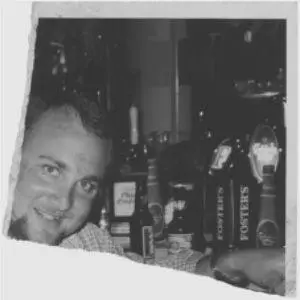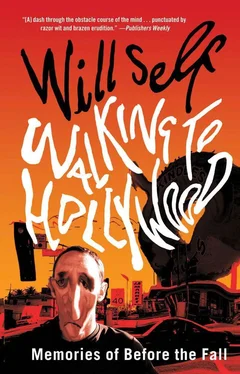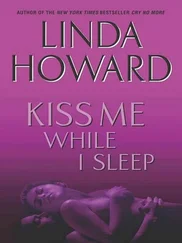Will Self - Walking to Hollywood
Здесь есть возможность читать онлайн «Will Self - Walking to Hollywood» весь текст электронной книги совершенно бесплатно (целиком полную версию без сокращений). В некоторых случаях можно слушать аудио, скачать через торрент в формате fb2 и присутствует краткое содержание. Год выпуска: 2011, Издательство: Grove/Atlantic, Inc., Жанр: Современная проза, на английском языке. Описание произведения, (предисловие) а так же отзывы посетителей доступны на портале библиотеки ЛибКат.
- Название:Walking to Hollywood
- Автор:
- Издательство:Grove/Atlantic, Inc.
- Жанр:
- Год:2011
- ISBN:нет данных
- Рейтинг книги:4 / 5. Голосов: 1
-
Избранное:Добавить в избранное
- Отзывы:
-
Ваша оценка:
- 80
- 1
- 2
- 3
- 4
- 5
Walking to Hollywood: краткое содержание, описание и аннотация
Предлагаем к чтению аннотацию, описание, краткое содержание или предисловие (зависит от того, что написал сам автор книги «Walking to Hollywood»). Если вы не нашли необходимую информацию о книге — напишите в комментариях, мы постараемся отыскать её.
Walking to Hollywood — читать онлайн бесплатно полную книгу (весь текст) целиком
Ниже представлен текст книги, разбитый по страницам. Система сохранения места последней прочитанной страницы, позволяет с удобством читать онлайн бесплатно книгу «Walking to Hollywood», без необходимости каждый раз заново искать на чём Вы остановились. Поставьте закладку, и сможете в любой момент перейти на страницу, на которой закончили чтение.
Интервал:
Закладка:
The sea fret had finally and entirely dispersed. The Struldbrug’s horny toes scrabbled in the sand, the yellow flowering birefringence hung on the neurofibrillary tangle of the gorse, the berries of the sea buckthorn were as shiny-yellow as benzodiazepine capsules. The wallpaper of the sky wrapped around our little colloquy, and for a moment it fooled me with its cloudy furbelows into thinking the three-bladed buckthorns were painted along the skirting board of the nursery, then I regained my sense of scale and grasped that these were massive wind turbines, a long parenthetic curve of them, tending towards the point of Spurn Head. How could I have not noticed these things during my tramp along the coast? Or even heard about them before I left… before I left… wherever it was that I had left.
‘You’re coming on down to the memory clinic with uz and the Struldbrug now — that’s what yer doing,’ the dementia advisor said in answer to a question I couldn’t recall having posed.
‘Aye,’ his number two pitched in, ‘’course you canav a cuppa and sum cayk.’
‘Cayk! Cayk!’ the Struldbrug crowed.
‘What other facilities are there at the… memory clinic?’ My voice swooped up into the interrogative, borne on thermals of hot, moist distress.
‘There’re digital enhancement programmes and neuralactivated webcam systems—’
I whimpered, and the senior advisor silenced his subordinate with a glare, then reassured me, ‘Aye, and there’s uz, uz dementia advisors to help you learn it all, after all, it can be a lot to take on board.’
We were within a few hundred paces of the clinic now, and it seemed to me that I must be a merman, for there were daggers thrust into the soles of my newborn feet, the attendants held me under either arm and I’d all but surrendered the power of speech when, seeing that the Struldbrug had lurched on ahead, I broke away and ran after him.
The ancient clattered along a walkway between thick gorse, and although I soon lost him I also lost my pursuers. I could hear them wandering around in the crannies between the bushes — one of them must have picked up a stick, because there was swishing, smiting and cracking as he cried, ‘Cummon ahtuv it you daft booger!’ and ‘No cake fer you if you don’t cum soon!’ But they soon tired of looking for us, and one of the dementia advisors called to the other, ‘I’m fed oop. He’ll cum back when ’e’s ’ungree.’
I was left alone in the desiccated undergrowth and crawled out from the sandy cave beneath a root system, then limped through this fine dust of ages towards a crest from where I could see the whole semicircular sweep of the beach. The Struldbrug was down there already, paddling in the shallows, his shaggy head dangling low. I wondered what he could be looking for so intently, and felt frustrated by the pointlessness of asking him.
I took off the empty rucksack, unlaced the stabbing boots and cast them aside, to be followed by T-shirt, trousers, smalls unlaundered for the entire trip, all of which I left behind me on top of the gorse bushes, like the pathetic unpacking of a plane-crash victim, compelled by Death. All I hung on to was a notebook. I needn’t have felt frustrated, because as I walked towards the Struldbrug I grasped what it was that he sought, first peering into the ripples, then rearing back: the end of the peninsula. The shoreline curved so symmetrically that the exact point where the sea met the waters of the estuary was impossible to gauge.

I shared his obsession, and so the two of us moved back and forth in the shallows, crossing and recrossing, intent on the elusive terminus. After some time we had achieved a consensus and stood confronting one another — I naked, he in his rags. I dared to look upon his medieval features. The next stop is Victoria, change here for District, Circle and Piccadilly lines and mainline rail services … I opened the notebook and a scrap of black-and-white photograph fell on to the water between us and floated there. I stooped to peer at a scraggy beard, an attempt at a quiff, a row of optics. I looked up at the Struldbrug and thought I could see a resemblance, but when I glanced back at the scrap it had been spun away by the wavelets, leaving me behind, paddling in the Now.
Afterword
On 17 July 2008 I was making my children supper in the basement kitchen of our terraced house in Stockwell, South London, when I heard a commotion in the street outside and the demented shriek of emergency services sirens. When I opened the front door I found some of my neighbours already standing on the front steps of their houses, the street was full of police cars, and an ambulance was parked further up. Very quickly it became clear that a young man had been attacked and stabbed immediately outside the house by a group of youths; he had staggered up the road and collapsed about a hundred yards further on. Paramedics and a doctor who lived locally fought to save his life, but he died three hours later. He was eighteen years old, his name was Frederick Moody Boateng, and he was the twenty-first teenage fatality from a stabbing in London that year.
Freddy’s family lived six doors up from us, and although I’d nodded to him in the street we’d never exchanged a word. In the immediate aftermath of the murder, shocked local people said the usual things about the senselessness of the attack. It was thought the assailants might also have been at a spontaneous water fight in Hyde Park that Freddy had attended that day, and that something had happened there that caused them to lay in wait for him. The suppressed premise, of course, was whether Freddy was a ‘good’ or a ‘bad’ boy.
Soon enough another narrative emerged: Freddy had been in trouble before, the doorman in the nearby flats alleged that he had been there immediately before the knifing, and someone else said that rocks of crack cocaine had been found on him. The man in the local park who does youth football coaching told me that Freddy had asked to participate in his sessions, but that ‘He was mixed up in drugs, so I told him no. I won’t take anyone who can’t stay out of trouble.’
Three young men stood trial for the killing in January 2009, all on charges of affray. It was understood that the police had been unable to get sufficient evidence for a murder charge, and besides the actual knifeman was said to have fled to Jamaica. In the event, none of the three accused received more than a three-year sentence. This barely made the news anyway — by then the focus of attention had long since moved on, and there were tens if not scores of stories with more obviously moralistic dramatic arcs to satisfy English connoisseurs of murder.
But Freddy’s killing stayed with me by reason of proximity alone: this was not murder considered as one of the fine arts, but homicide as interior decoration. The crime scene tape decked the street for a week or more. For the first couple of days we had to be escorted to and from our house by police officers. Then there was the shrine created by Freddy’s friends at the end of the block, with its blooms dying in cellophane, his name outlined in tea lights, and a sad little assemblage of cards, water pistols and handwritten poems. The kids stood vigil for him, at first every night, then weekly, then monthly. There was the funeral, a memorial service — the family were active in a local church — and a march protesting against the epidemic of knife crime. All of these gatherings forced an awareness of community on the inhabitants of this very typical — and typically polyglot — inner London residential street.
Читать дальшеИнтервал:
Закладка:
Похожие книги на «Walking to Hollywood»
Представляем Вашему вниманию похожие книги на «Walking to Hollywood» списком для выбора. Мы отобрали схожую по названию и смыслу литературу в надежде предоставить читателям больше вариантов отыскать новые, интересные, ещё непрочитанные произведения.
Обсуждение, отзывы о книге «Walking to Hollywood» и просто собственные мнения читателей. Оставьте ваши комментарии, напишите, что Вы думаете о произведении, его смысле или главных героях. Укажите что конкретно понравилось, а что нет, и почему Вы так считаете.












